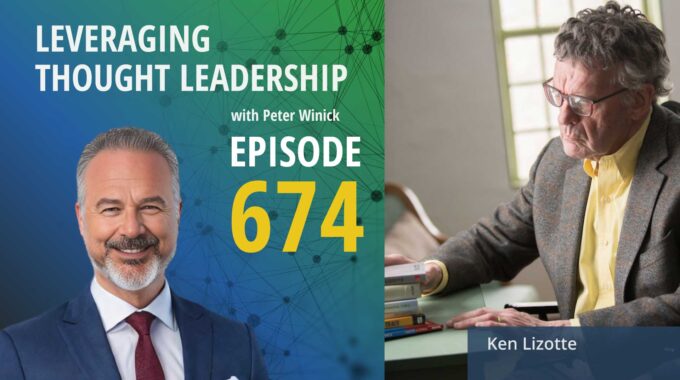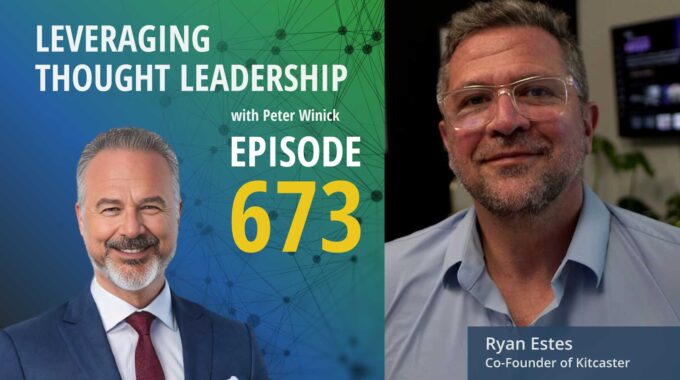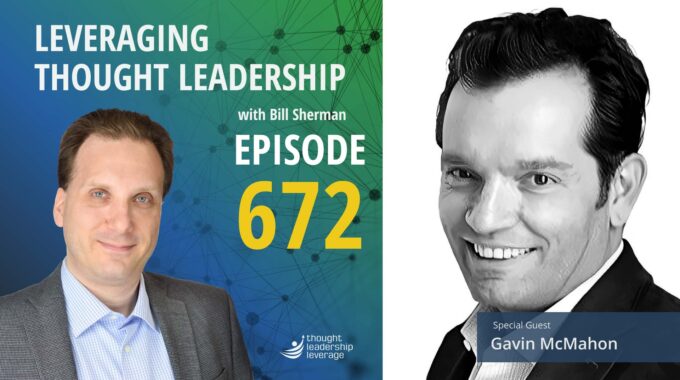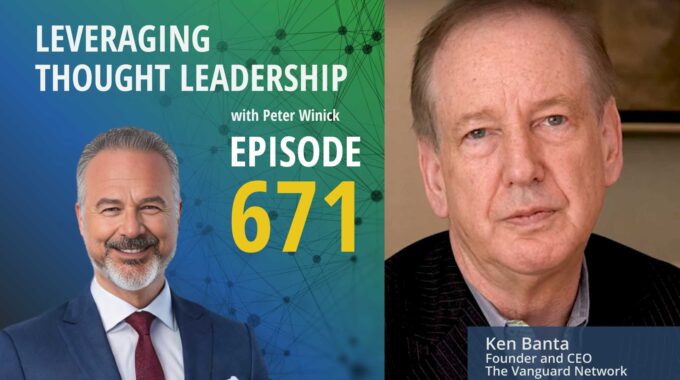Why Great Thought Leaders Don’t Play the Publisher’s Game Peter talks with publishing expert Ken…
Speak-Up Culture | Stephen “Shed” Shedletzky
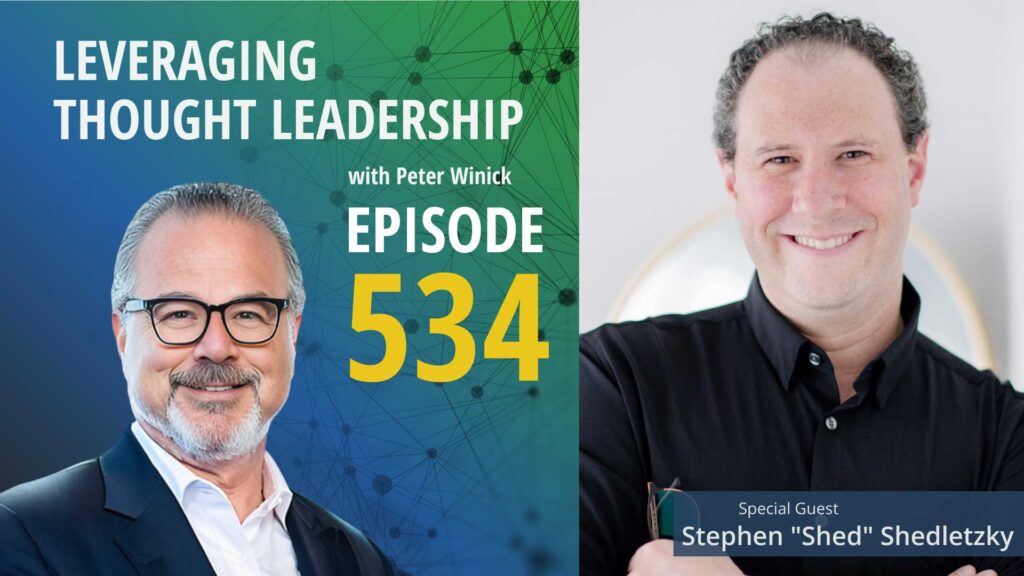
Developing a culture that embraces speaking up and psychological safety.
An interview with Stephen “Shed” Shedletzky about developing his own content, writing a book, and the future of Speak-Up Culture.
Before anyone shares their ideas, feedback, or concerns they tend to ask themselves two questions: Am I safe to speak? And is it worth it?
If the answer to either of these questions is no, odds are they will stay silent.
So how can leaders, teams, and organizations facilitate an environment where speaking up is celebrated and not ignored or punished?
Our guest today is Stephen “Shed” Shedletzky, a speaker, leadership coach and advisor who is using his new book Speak-Up Culture: When Leaders Truly Listen, People Step Up to help create a culture where people feel safe and supported to take part in and start conversations.
Shed shares how his work with Simon Sinek laid the groundwork for developing his own content that focused on two areas that stood out to him over his years of work: psychological safety and living your message.
We examine what psychological safety and Speak-Up Culture mean to Shed and how he is bringing these elements to individual’s, teams, and organizations. In addition, we discuss how psychological safety still comes with accountability, which is best achieved by mutually established agreements that bring what is best for both employee and employer to the front.
Three Key Takeaways:
- Business books are written for two reasons. It’s something you are so good at you want to share that knowledge. Or you are so bad at it that you need to write a book to fix it.
- You must live your message both inside and outside of your organization. If you talk the talk but fail to walk the walk people will see right through you.
- When people don’t feel like speaking up, they can become apathetic. When they don’t feel safe, they stay silent. Creating an environment where employees can speak and be heard builds a happier and higher-functioning atmosphere.
If you need a strategy to bring your thought leadership to market, Thought Leadership Leverage can assist you! Contact us for more information. In addition, we can help you implement marketing, research, and sales. Let us help you so you can devote yourself to what you do best.

Transcript
Peter Winick And welcome, welcome, welcome. This is Peter Winick. I’m the founder and CEO and Thought Leadership Leverage. And you’re joining us on the podcast today, which is Leveraging Thought Leadership. Today, my guest is Stephen Shedletzky, which is why he goes by shed obviously is Stephen. Yeah exactly. We’ll just go with shed Yeah shed is the author of a new book which is Speak Up Culture published by page two. He’s been around the thought leadership space in terms of being a certified one of the first certified folks in Simon Cynic’s work. And he’s with us today. So welcome aboard. Should thank you for allowing me to butcher your name.
Stephen Shedletzky That’s all good. It’s a delight to be with you. It’s when I when I go to events in the person who’s about to introduce me says, you know, there’s always that awkward moment where, like, I know they’re going to ask me how to pronounce my last name. And my response is, I don’t know.
Peter Winick It’s funny.
Stephen Shedletzky So Shad works.
Peter Winick Well, you know, why didn’t they butcher that, you know, schedule? I was going to say, why didn’t that get chopped when the family came into Ellis Island or wherever they came in like the rest of our name, who knows? Another story. So we’re I want to score with you is you are now, you know, an author. You’ve got your own body of work. But for a long time, you’ve been making a living delivering other folks work. And we’ve seen this with people like Simon Sinek, Brené Brown, John Maxwell. It’s a fairly common model of people fall in love with some work, right? Somebody IP and intellectual property. They have certain skills they can facilitate, they can teach, they could speak, etc. But then there’s this thing burning inside that is. But I’ve got my own thing. How that sort of played out for you.
Stephen Shedletzky Yeah. I mean, Peter, I. I never thought I would do this. I mean, I love Simon’s message. I thought I’d be doing that with him for the rest of my career. I still do some work with Simon Steen, which is great. And being out in the world and having keynotes, people would come up to me and say, Hey, when are you going to write a book of your own? And my response would typically be, at least up until about a couple of years ago, it was If and when I ever come across something worth writing about, I’m sure you and I have all come across keynote speakers who come out with books because they need something to sell on the back of the room. And I. I never wanted to write one of those books because I work with this prolific author who’s so good at what he does that I didn’t see a need to contribute anything further.
Peter Winick And you know, on that note, I always look at and say, oftentimes someone writes a book and you read it, you’re like, You know what? That could have been a Ted Talk. 18 minutes of that was kind of enough. The real beautiful books. My personal opinion is that Ted Talk where you’re like, Oh my God, give me more. That really needs to be a book because that was just a barely the first nibble of a of a beautiful meal. And I think you can tell the difference when it’s sort of, Oh God, I need 60,000 words, 241 pages because it’s a book thing.
Stephen Shedletzky So yeah. Yes. And I mean, that’s Simon’s work in a nutshell. I mean, you know, the beauty of Simon’s work is it’s complex ideas simply organized and simply presented in a way that can be understood and acted upon. And those start with why is quite repetitive. And Simon says he did that on purpose. It’s like a good accordion. We’re like, Yeah, but like you open it up and there’s fissures and there’s pretty big ideas around culture and leadership. So anyway, I, I had this moment in the middle of a pandemic. It was the beginning of 2021. And like others, I was bored. And like others, I was contemplating, you know, is this it? And I made a conscious effort to start saying yes to more stuff that would come my way. Because I’ve been doing work with Simon for all these years, developed an amazing network of folks, and every now and then someone would reach out to me personally and say, Hey, I have this event, can you come speak at it? And I would say, Sure, we can do it through Simon’s team. And this is the cost. And there is one individual, this guy Barry Engelhart out of St Louis, who runs the Society of Human Resources Management out in St Louis. And I told them, you know, we can do it through Simon and this is the budget. And he said, That’s my budget for all speakers, so we’re not going to do that. And I went, okay. And so I hopped on a call with him and I said, Well, let’s do something else and I can do something, and maybe I’ll bring along my buddy Rich. Rich Devaney, who wrote the book The Attributes Riches, a retired seal out of Virginia Beach, wrote this amazing book, differentiating between don’t just hire on skills. Look at human characteristics and attributes, adaptability, resilience, empathy. Right? And so I said yes to my buddy Barry, fully banking on my friend Rich being available. So I get off a call with Barry. I call up my friend Rich. I say, Hey, what are you doing October 20th, 21 on this date? And he says, I’m busy. I’ll be in Oklahoma giving a keynote. And I went.
Peter Winick Up.
Stephen Shedletzky And went, Oh. And so I went, All right, I’ll do. My own content, whatever that is. So that was I said yes to that. Talk about March, April 20th, 21. By June, July, I get the email from the organizing committee on a Friday night and it said, We’re so looking forward to your keynote in October. Please click this link and fill out your title and description. And I went, Oh, right, right. And so it was just like.
Peter Winick But let me let me push on that. But even though you went, Oh, this isn’t total blank slate, you’ve had ideas rattling around in your head. But I think that part of it is in the business side of thought leadership. There’s people that are front of the house delivering, people that are back in the House, that are on the business lender that are creators, and there are people that deliver other people’s stuff. So it wasn’t like maybe it was. I’d be surprised. You have any ideas or any original thoughts. You just didn’t have them formatted structured in a way that you could show to the world, This is what I’m going to do and how I’m going to do it so that that ownership moment of give me your outline, you’re like, Ha ha ha, having written it yet. But I would do it on the plane on my way there.
Stephen Shedletzky And also, I think I think you’re right in giving me more credit than perhaps I’m giving myself. There are two areas that really stood out in my work with Simon over the years and reading Adam Grant and Bernie Brown and other thought leaders and the two sort of ideas were and Amy Edmondson, The two ideas were this thing called psychological safety really matters, and yet it’s misbranded. And the other was my role on Simon’s team, even though I had an internal role and I was building products and I was leading our speakers in facilitators, the lens and the number one priority I always saw in my role and I always made sure is in my job title and job description, was living our message from the inside out of that company. And so, well.
Peter Winick You have, you know, and I think that’s important in regardless of your thought leadership is you have to eat your own dog food. Every touchpoint of the organization needs to be representative of whatever it is. You know, if you’re talking about vulnerability, of talking about results, whatever your IP is at every step along the way, you better represent that.
Stephen Shedletzky Yes. And I’ve seen far too many prolific organizations who talk a good talk on the outside. But you go into their internal operations and it’s toxic.
Peter Winick Well, I also think that there’s a piece of it is why does someone get go from being intrigued by to curious, to obsessed with an idea and some of it and this is just my theory. I don’t have the data to back it up. It’s probably something that started in therapy, you know, or know if somebody is working on trust, maybe they have trust issues. If somebody is working on, you know, being overwhelmed in the workplace, maybe they’re like, whatever it is usually an origin story, whether they’re aware of it or not. That is deeply personal. And in turn.
Stephen Shedletzky My dear friend Leanne Davey, who wrote the book The Good Fight, she did my book launch with me in in Toronto. She co-facilitated it. It was brilliant. And she said business books are written for two reasons. One reason is it’s something that you’re just so good at it you have to get it out of you. Right? You have to get it out of you. Or everyone keeps asking you like, how do you have conflict conversations? Like you’re so good at this, right? And then there’s the other which Leanne says has been hers, which is she’s so awful at it that she needed to write the book herself. Right. So I think and I think, you know, those aren’t binary. I think there’s a spectrum. But yeah, I mean.
Peter Winick So how did you come up with the IP and the thought leadership that’s now living in speak Up culture and. What are you doing? What else are you doing with it? Because obviously you’re not living large on royalties.
Stephen Shedletzky But yet. Yeah. Yes. So first and foremost, you know, my origin story with this is I grew up with the stutter, so I know what it feels like to be voiceless. And that that was, you know, talk about the thing that I unearthed in therapy. It’s that, you know, and I’m such a big believer that the very things we can overcome, especially as young people, can be the things that can become our strengths and our purpose.
Peter Winick So and that’s awesome because who would have thought that, you know, a younger shed, the stutterer is going to make a living being a professional speaker, communicator, etc.. So kudos to you and I thank you. Thank you. And thank you for sharing that.
Stephen Shedletzky Yeah, I also married a speech therapist, which was a great choice.
Peter Winick Well, cheaper than paying for the services, right?
Stephen Shedletzky Yeah. Yeah. Well, for my kids and nieces and nephews. Yes. So. So, I mean, that’s one. The other is just my experience. 15 plus years in a career and seeing different cultures, both teams, I’ve been part of clients that I’ve served. And seeing the stark difference between those that have a speak up culture and it’s marvelous both for relationships and results and then the very opposite. And how much effort is wasted in organizations that don’t have a speaker culture.
Peter Winick If you’re enjoying this episode of Leveraging Thought Leadership, please make sure to subscribe. If you’d like to help spread the word about our podcast, please leave a five-star review at ratethispodcast.com/ltl and share it with your friends. We’re available on Apple Podcasts and on all major listening apps as well as at thoughtleadershipleverage.com/podcast. So, when you use a term like speak up culture. Yeah right. So, I love it, but I think that you probably have what is your definition of what I speak up culture is and why is it one that doesn’t look like that.
Stephen Shedletzky So to speak of culture is an environment in which people feel it is both psychologically safe and worth it to speak up, to share ideas, opinions, feedback, concerns, disagreements, especially with someone more senior to them. And admit, admit, mistake. And they do all of that, believing it will lead to improvement, not being ignored or not being punished.
Peter Winick Okay, so stay there for a second, because I believe just my belief when dudes believe that there are elements of any high-quality thought leadership that are evergreen. So regardless of did the stock market go up a thousand points that we in a recession what’s going on and you like it regardless of what’s going on economic cycles there is something evergreen on what you’re talking about with speak up culture right there. There are also things that have happened where for whatever reason, something becomes more in vogue or we’re talking about it. So, take let’s take psychological safety is a perfect example. I believe pre-COVID, we rarely had that conversation or whatever. You know, psychological safety meant someone, you know, wasn’t going postal in your office. The only training, we had is if something Wow. If it said came into work and kept, you know, with the news saying, I think I’m going to end my life. Okay, well, we had systems to respond to that. But other than extreme, that wasn’t a term or a thing that we talked about. I mean, I grew up in a check your baggage at the door environment in the workplace. In the 80s, when I got out of college, it was like nobody wanted to hear your crap. It’s like we own you from nine to 5 or 97. Do your job, get the hell out and like, okay, go tomorrow, go grab a beer or a seven and deal with your own shit. Right? Like it’s different today. So, I think my point to that is right now the world is more open to these conversation than it was 3 to 5 years ago. So how do you how do you how do you respond to that?
Stephen Shedletzky I fully agree. And I mean, I call it the Starbucks problem with that. What’s that? That’s boring.
Peter Winick Well, it’s boring, right?
Stephen Shedletzky Let me let me add on. So part of the issue, though, is it’s in our human experience where the pendulum swings too far.
Peter Winick Exactly. Right.
Stephen Shedletzky Right. So Starbucks is popular. There’s a Starbucks in every block and then it scales back. So I agree because I’m not sure if you’re aware there is this thing called the Covid 19 pandemic where I heard about everyone was struggling. And so all of a sudden, this thing called empathy and compassion and psychological space and mental health, really it was already you know, there was already a movement going in that direction. But we had this equalizing or I don’t want to say equalizing because some folks hurt more than others socio economically. But everyone suffered to some degree.
Peter Winick During when everyone in voluntarily had to cope with change, whatever that meant, from extreme to too minor to inconvenience to financial duress. Right? Like, yes. Yeah.
Stephen Shedletzky And I mean. Project Aristotle 2004 puts psychological safety is the number one determinate. So this is well known. So let me talk about the pendulum swing. I also want to talk about why I called it Speak Up culture. So I don’t love the term psychological safety. Neither does Amy Edmonson. She fully admits she uses the term and hurt her term esteem, psychological safety, because it’s about a team, not just about an individual. But she herself. She uses the term because there is a reviewer of one of her early papers who said, Oh, you’re talking about psychological safety, to which her response was, Oh, all right, if that’s what’s going to get me published, let’s go with that. Like, it’s not a great God.
Peter Winick It’s like a bad nickname that you got stuck with or something like that. It just stuck. Yeah.
Stephen Shedletzky Totally. So it’s not sexy. It doesn’t describe what it is. So I lead into good old Zig Ziglar. People don’t buy drills. They buy whores. So if the drill is psychological safety, well, then the whole is a speak up culture. That’s what you get. Right? So let’s talk about that. Now, as I dug into it, it’s not only psychological safety, it’s also impact. So the two questions we ask ourselves before we speak up, whether it’s consciously or subconsciously, is it safe and is it worth it? Because sometimes it’s safe, but it’s not it’s not going to lead to any change. And apathy sets in. Sometimes it isn’t safe, but it’s the impact of it is so high, the stakes are so high. Like an Ed Pearson at Boeing, he didn’t feel safe, too safe to speak up. Or at Kimberly Young McAleer at the U.S. Coast Guard. She spoke up for her own survival around her.
Peter Winick But I see a matrix in that of, you know, when it’s safe and important enough because you don’t want to be the boy that cried wolf. Right. So it’s got to be important enough and safe enough, if not bad things happen. Right.
Stephen Shedletzky So and then so to your point, it’s not just psychological safety that creates a spike of culture. It’s also high accountability. Okay. So one of the issues that I think we’re getting in with a newer generation in the workforce that that grew up with mental health days, which is wonderful, but it isn’t an excuse to have zero accountability.
Peter Winick So exactly.
Stephen Shedletzky I just met with a major U.S. based airline who’s all run by people of your generation, most of whom are.
PW Oh, wow. Ow, Ow.
Stephen Shedletzky You called yourself out as to when you came, you know, started in your career. So that’s what I was basing that that comment off of. Peter Come on. Come on.
Peter Winick Now. You didn’t. Don’t “Okay, boomer” me. because I’m not. Yeah.
Stephen Shedletzky So also Gen Xers and former military male, you know, and to be an effective professional in military, you need to have this attribute card called compartmentalization, which is when you show up and do the job and when bullets are firing you, you can’t say, I don’t feel psychologically safe because then you’re dead and the people around you are dead right now.
Peter Winick Maslow kicks in. The psychological safety is much higher up the pyramid than bullets flying by my ear. Yes, the time is right.
Stephen Shedletzky Yes. Now for the for the health and wellbeing long term. And to avoid PTSD, we do need to have a place to outlet that. But one of the challenges I think older generations or folks who are better at compartmentalization struggle with those who who. So for example, there’s one pilot who’s in training and who’s bowed out because they need space for their mental health, to which the leader of this pilot training said, that’s good and fine and we support you. But like, what’s going on? What do you need? Okay, you need to have some conversations. How long do you think those conversations are going to take? Four days. Great. Can we expect to have you back at training because we’re still operating a business here by Friday. And it’s like, yeah, I agreed to that. Wonderful. How about let’s check let’s check in Thursday midday jets or just to ensure, you know, so psychological safety isn’t without accountability. It’s also around boundaries and expectations. And I’m for I love the word agreements rather than accountabilities. I think accountabilities are assigned agreements. Yeah. Shared and mutual.
Peter Winick Well, let me just add to that, though. I think one of the secrets to seeing if you thought leadership is great from an enterprise application standpoint is doesn’t work at an individual level. So psychological safety, primarily the marketing around that language has been, oh, for me, the individual I mean me mean. We want to feel psychologically safe, which is lovely. That’s cool. But then the next is team like, Well, how cool would it be to be on a team where psychological safety is part of who we are so that we can share, we can be more creative, more innovative, take more risk, be more vulnerable, whatever. And then the ultimate the vision is really, wow, What would it look like if this organization really embraced it? And I think too many thought leaders sort of stop at the individual and sort of play with the team and don’t think big enough, because where the money is, quite frankly, is the thought leader is getting the organization to say, we want to be a psychological safety organization, then go to someone like you and say, Hey, shed, what do you got besides that book? Right? Like, what do you got to help us go through this transformation over the next 18, 24 months so that everyone from retail frontline to senior leadership to whatever feels it, and how would we know it and how would we measure it, and what’s the business impact?
Stephen Shedletzky And one of the challenges is as a human being and a human species, we aren’t good at scale. So, yes, this is why it’s really easy to think about ourselves. It’s very easy to think about the people around us. That’s human. But in the same way, Peter, when folks ask me, name an organization who’s doing this? Well, I go, No, I’m not going to name an organization who’s doing this well, because even if they’re doing it well today, talk to me in three years, you know, Microsoft under Bill Gates, dorky but quite visionary. Ballmer Toxic and short, short-term mindset, finite mindset. And now under Nate, under such an Nadella white, infinite minded, you know, they talk about learn it all rather than or know what our culture like I like what I’m hearing from now.
Peter Winick And even that is you’re painting with a broad brush. I’m sure even under Ballmer, there were probably pockets of exceptions, you know, specific leaders that had psychologically safe environments.
Stephen Shedletzky Totally as well as pockets of the current Microsoft where people don’t feel psychologically safe because no organization or leaders are perfect. But absolutely. And yeah.
Peter Winick Sorry. Go ahead.
Stephen Shedletzky Well, I didn’t answer your question on the work that we do, which I’m happy to very, very quickly. So, I mean, I’m a small outfit. It’s me. It’s one employee and some in some contractors. So I describe our work as high, medium, low touch so high touch is show up lie that keynotes workshops coaching medium touch is the same but pants are optional so doing this and then low touch which is where scale really lives which is you know we don’t yet but we’re working on and an assessment online courses all the things so yeah and I’m really big on I don’t need to do it all on my own where there’s partnership, there’s partnership and let’s do it. Let’s do it together. What?
Peter Winick Got it. Cool. Well, this has been great. I appreciate your time and transparency and sharing your story. Good stuff. Wish you the best.
Stephen Shedletzky Thank you so much, Peter. Cheers.
Peter Winick To learn more about Thought Leadership Leverage, please visit our website at ThoughtLeadershipLeverage.com to reach me directly. Feel free to email me at Peter at ThoughtLeadershipLeverage.com and please subscribe to Leveraging Thought Leadership on iTunes or your favorite podcast app to get your weekly episode automatically.


